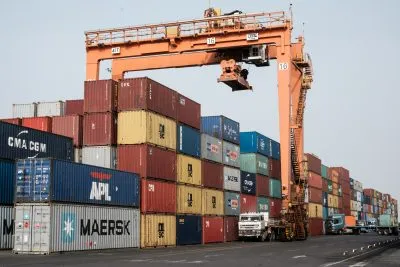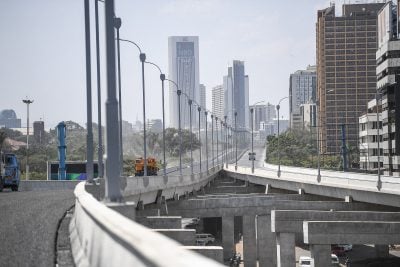In the normal course of events, the election to the powerful position of head of the African Union Commission causes few public or media ripples. That was not the case this year when delegates met in Addis Ababa to either give incumbent chairman, Jean Ping, another term in office or to switch allegiance to the challenger, Dr Nkosazana Dlamini-Zuma. At stake was the increasing importance the continental body is playing, especially in Africa’s economic resurgence.
If there was ever a doubt about the effectiveness of behind-the-scenes politics, South Africa put it to rest by demonstrating the power of deal making in the corridors of power during the 2012 African Union (AU) summit in Addis Ababa. The summit took place in the regional organisation’s brand-new 20-storey headquarters, paid for and built by China.
But behind the smiles and handshakes, a major drama was playing itself out. The battle for the leadership of the AU Commission, with all the political and economic clout it is increasingly attracting, was gathering steam.
A political head of the AU assembly is chosen yearly from among the continent’s heads of states and an administrative head of the AU Commission is elected every four years. This year saw the President of Equatorial Guinea, Teodoro Obiang Nguema, replaced by President Thomas Yayi Boni of Benin as the chairperson of the AU assembly. It was the election of the AU Commission head that made the summit anything but business as usual. The annual AU summit is a non-event for most people in South Africa but this time around, the media was buzzing with excitement because Dr Nkosazana Dlamini-Zuma, the current Home Affairs Minister and former Foreign Affairs Minister, had thrown down the gauntlet and was challenging incumbent Jean Ping, former Foreign Affairs Minister of Gabon, who was seeking a second term.
Given Africa’s increasingly important status in the global economy – as an exporter of essential minerals, as a rapidly growing consumer market and an increasingly attractive destination for foreign investments – the AU Commission has risen in status and influence. It often speaks on behalf of the continent in international forums and sets both industrial and political benchmarks for the continent.
In this context, the chairmanship of the body has assumed far greater significance than it had enjoyed for decades hitherto. With this scenario, the nationality of the chairperson also takes on considerable significance as it can be seen as a leadership role at the executive level. This explains why South Africa was keen to push the candidature of Dr Dlamini Zuma and why, judging from social networks and radio talk shows in South Africa, many expected Dr Zuma to get the position.
She is held in high regard back home mainly due to her relative lack of controversy and to the high esteem in which she is held in the country for the progressive changes she brought to the government departments she headed, especially the manner in which she turned around the Home Affairs department, which was riddled with many problems, including corruption and incompetencies.
However, Dr Dlamini-Zuma’s bid for the position was neither straightforward nor traditional. Her candidature meant, firstly, that potentially, the position of commission head would be held by a woman for the first time in the organisation’s history. Secondly, it would be a challenge to the unwritten understanding that the position of commission chair be reserved for the smaller states in the continent. The deviation from this custom has both enthusiasts and opponents.
Unexpected stalemate
There are concerns that South Africa’s candidature is a further effort by the country at political leadership and dominance in the continent. On the other hand, South Africa’s bid was seen as necessary in order to prevent a repeat of the embarrassment the AU suffered during the Libya crisis when the AU’s efforts at negotiations were disregarded and a military solution was pursued by Britain, France and the US in solving the African nation’s conflict.
Sources have, in fact, claimed that the main reason for South Africa’s bid to replace Ping was due to the criticism from African leaders for the way he responded to the Libyan and Ivorian crises. Despite vigorous efforts by the AU during the Libyan crisis to come to a negotiated settlement between the late Libyan leader Muammar Gaddafi and Libya’s then rebels, a military intervention was undertaken by Western powers and ended in the brutal road-side killing of the former leader. Given the very prominent role that Gadaffi himself and Libya played in the AU, and given the Libyan investment funds targeted for development projects in the rest of Africa, the crisis and its aftermath will have, it is widely believed, considerable economic repercussions in the continent.
The sidelining of the African continent’s views on events taking place in one of its own member states, and the Western powers’ rapid resort to the use of force that has flattened several cities in the country and killed or injured large numbers of people, is a severe blow to the continent’s prestige and its own conflict resolution mechanisms – many of which, including the independence of South Sudan, have been very successful.
When, before the voting, Dr Dlamini-Zuma said that she would “spare no effort in building on the work of those African women and men who want to see an African Union that is a formidable force striving for a united, free, truly independent, better Africa”, she struck many chords among the delegates.
However, despite all open and hidden lobbying and campaigning, after three rounds of secret ballot voting, neither candidate had the necessary two-thirds majority needed to assume the leadership position. Unconfirmed sources within the AU reveal that Ping won 28-25 in the first round, 27-26 in the second round, and 29 to 24 in the third round. In the crucial fourth round (at which point Dr Dlamini-Zuma had to withdraw, according to AU rules) Ping could not garner the required 36 votes he needed for victory. “Neither of the two candidates emerged as a winner,” Zambian President Michael Sata announced to the dignitaries present.
Following intense discussions, it was decided that Jean Ping would continue in his position until fresh polls are held in June in Malawi. Although, on the face of it, the outcome was interpreted as a loss for both candidates, the South African delegation present at the newly-unveiled Chinese-funded AU headquarters, broke into song and dance at the announcement of the stalemate vote.
According to officials at South Africa’s Department of International Relations and Cooperation, a main objective for Pretoria was to unseat Ping, whom it was felt was not assertive enough during his tenure to ward off Western meddling in African affairs and in protecting the continent’s independence and sovereignty.
It has not yet been confirmed whether Dlamni-Zuma and Ping would be contesting the new elections or if new candidates will be presented. A victory for South Africa will have two significant implications: first, the position previously left for the smaller African nations will now be taken by a continental giant. Whether this is a positive development is debatable. Second, a victory for Dlamini-Zuma will have the historical significance of the organisation electing its first female leader, progress many feel is long overdue, considering that over 50% of the continent’s population is female.
Want to continue reading? Subscribe today.
You've read all your free articles for this month! Subscribe now to enjoy full access to our content.
Digital Monthly
£8.00 / month
Receive full unlimited access to our articles, opinions, podcasts and more.
Digital Yearly
£70.00 / year
Our best value offer - save £26 and gain access to all of our digital content for an entire year!
 Sign in with Google
Sign in with Google 



